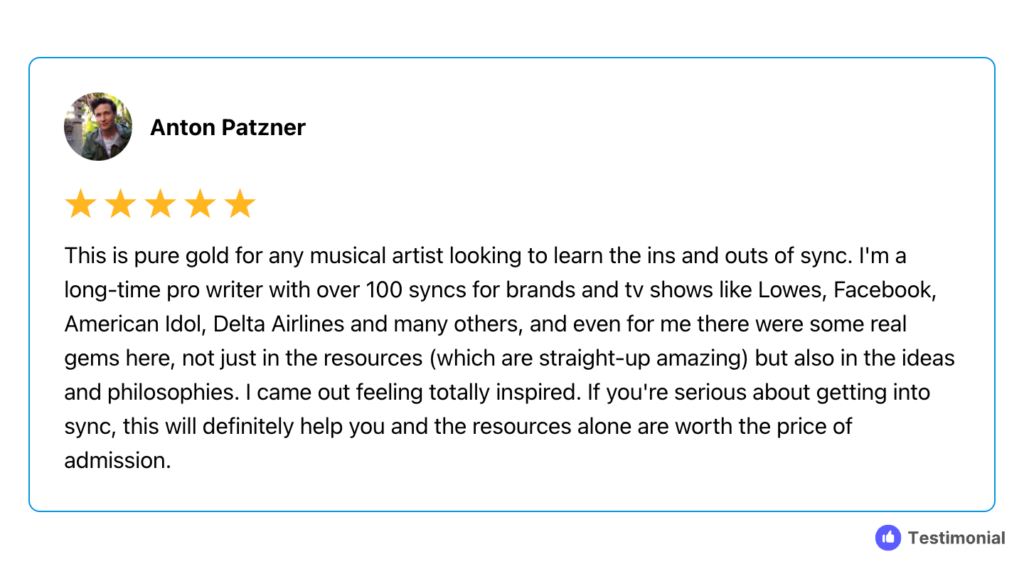Read time: 4 minutes
vidsyn: old norse for broad vision of creative thinking and forward-looking perspective. How will you unlock your creativity today?
Sync Agents Demystified
I’m often asked about the best way to get your music in front of music supervisors. Invariably, my answer is always to work with a sync agent. I have worked with sync agents from both sides and see them as an invaluable partner in any musicians career. Today, I’d like to share what to consider when looking for a sync agent and the best way to find a good fit.
Sync agents represent artists purely for sync opportunities. Unlike a label or publisher, their only goal is to get you syncs on TV, film, commercials or anywhere they use music to picture. Sync agents can bring so many opportunities through their deep relationships with music supervisors, editors and decision makers in all mediums. In a world so saturated with new music releases, those deep connections will help your music shine through.
Unfortunately, there are many reasons musicians may choose to go it alone:
- Lack of awareness that sync agents exist
- Prefer to handle all aspects of their career themselves
- Perceived loss of creative control
- Reluctance sharing profits
The good news is the right sync company can help your marketing presence, drastically increase opportunities, and allow you to keep your creative control.
Sync companies need you as much as you need them.
Sync agents need new music to send for their clients briefs AKA music supervisors. So there are many companies looking for fresh new artists to fill that need.
Benefits of working with a sync agent.
Working with a sync agent is the number one way I’ve seen to jump to the front of the line and start getting sync opportunities for your music. There is literally no way for a music supervisor to reach out to each individual artist for an opportunity, so we typically reach out to dozens of companies that may have the right music for the spot we’re working on.
- Sync agents have spent years building relationships with music supervisors and other music buyers.
- We know that they have done all the legal work to guarantee that there aren’t any issues with the music (IE uncleared samples, missing writers)
- Typically you still own your music and only pay the agent their share when sync opportunities arrive.
- You maintain creative control over your music (unlike some labels), but also add a valuable team member for input.
How to choose the right sync agent
Not every sync agent is right for you. Similar to a record label, I suggest looking at their roster and deciding if you’d fit in with the rest of the artists they represent. This doesn’t necessarily mean genre as we’re more and more in a genreless era. It’s more about brand aesthetics and how they represent themselves to the industry. You can also take into account the mediums they’re most successful in. Maybe you have a big high energy sound that is ripe for advertising and trailers, then you should work with a company that has had a lot of success in that lane.
There are a few ways to find these companies:
- Find a commercial or show that you enjoy and feel like your music would fit well with. Google who represents the artist for sync licensing and you should be able to find the company responsible. You can also look up the music supervisor or agency behind the ad and go further down the rabbit hole that way.
- Think of a band you like or that you feel is similar to your music and look up who they work with for sync licensing.
- Look up a music supervisor on Instagram and sort through their followers looking for music companies.
- I provide a comprehensive list of sync agencies and their submission process in my course.
Getting started working with a sync agent
I understand it can be a daunting process but the benefits will outweigh the upfront work tenfold. There are many ways to get ahold of a sync agent.
- Reach out to other musician friends and ask for a referral to their sync agents.
- Join sync focused online groups (Facebook & Reddit) or organizations to find others that work with sync agents or the agents themselves.
- Reach out by email or submission form on their website.
- Be sure to include a bio with your momentum as an artist. Have you had any syncs, streaming numbers, opening for more known acts, worked with a known producer? Anything that helps you stand out as someone they should check out. Your story goes just as far as the music itself.
I hope this provided a glimpse into the benefits of working with a sync agent and you now have an idea of how to go about getting started.
If you’re interested in learning more consider enrolling in my course, Sync Music Licensing Masterclass. I go even further into working with sync agents including, breaking down typical deal points and best practices.

